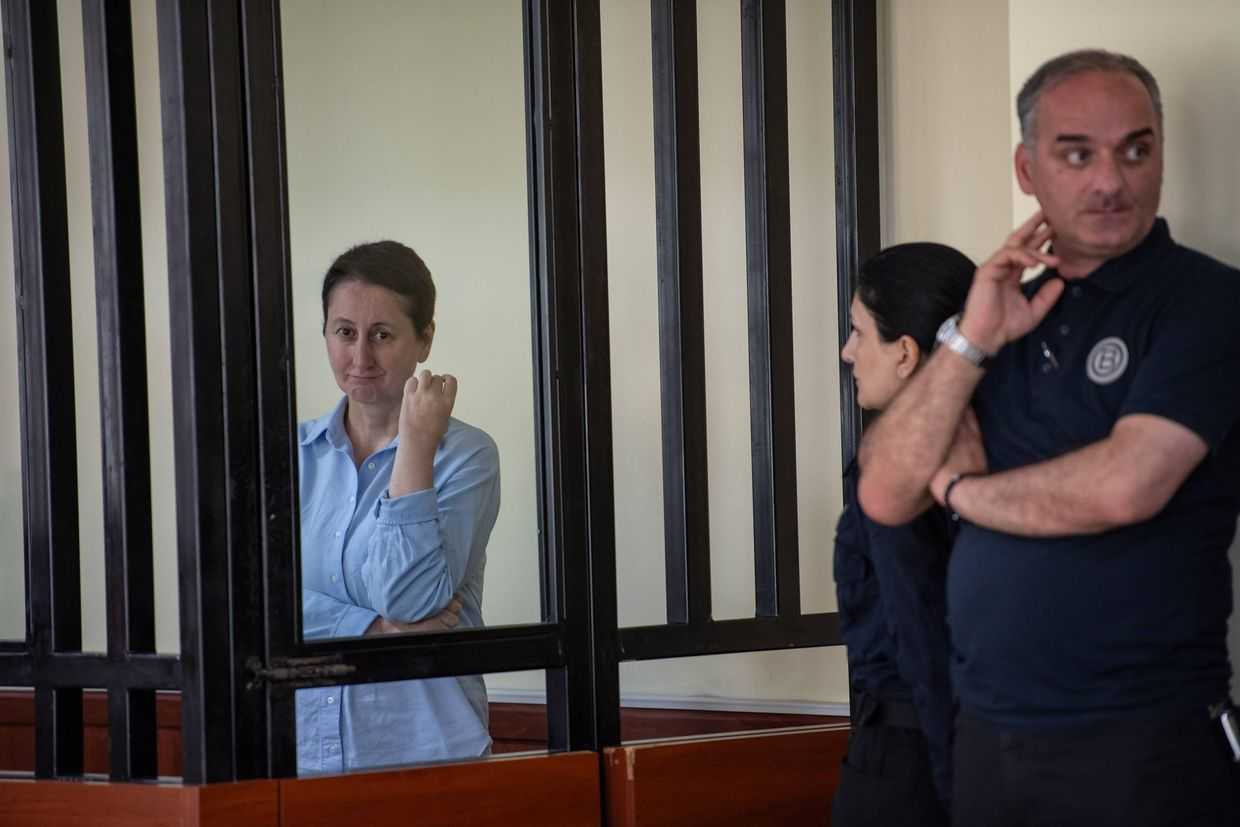The 9th London Georgian Film Festival: Vision and diversity amidst political hostility

The municipal elections in Georgia, scheduled for 4 October 2025, will take place in the middle of this year’s festival. In a growing climate of intense political polarisation, more than half of Georgia’s political parties have boycotted the election, further exacerbated by increasing repression against critics of the authorities, including the imprisonment of several opposition leaders, and lack of timely invitations for the OSCE to observe the elections, making ‘meaningful observation impossible’.
As the authorities continue to exert pressure on civil society, independent Georgian filmmakers are attempting to navigate the system or look elsewhere to make the films they believe in. With a strong tradition of speaking out against the authorities, the festival opens with a film that was banned for 50 years: My Grandmother (Chemi Bebia, 1929), a Georgian tour‐de‐force from the Soviet Eccentric Cinema Movement, is one of the most innovative and visually exciting silent films ever made. This satire on bureaucracy and bourgeois values, noted for its avant-garde anarchic style, unspools the foibles and follies that abound when the hero, an homage to American silent comic Harold Lloyd, loses his job as a paper pusher.
The internationally celebrated Swedish-born Georgian director Levan Akin is a contemporary, powerful, and outspoken voice, and the 9th edition of the festival will screen both his films And Then We Danced (Da Chven Vitsekvet, 2019) and Crossing (2024). Both films deal with queer characters ostracised by traditional Georgian values and current society norms.
And Then We Danced explores a fledgling gay relationship within the macho world of a traditional Georgian dance company. Having received a 15-minute standing ovation at Canne, it garnered much hostility in Georgia, with its actors and creators receiving death threats during its making and its opening night in Tbilisi.
Crossing is a remarkably moving story set in Istanbul, at the heart of which is a Georgian transgender character cast aside by her family and village, only to be sought after by her aunt later. Levan Akin will be in London for a Q&A session about his films.
The festival will feature another outspoken director and writer, Dito Tsintsadze, whose 2000 black comedy, Lost Killers, was first screened at Cannes’ Un Certain Regard. Tsintsadze had moved to Berlin in the 1990s and has since made over a dozen films in Germany and Georgia.
This year’s closing film is another Cannes selection: Imago (2025), a feature-length documentary exploring Chechen identity in Georgia’s Pankisi Valley, directed by Déni Oumar Pitsaev, who will also be in London for a Q&A. It is the first Chechen feature-length film to be screened at the Cannes International Film Festival, winning the top non-fiction prize, the L’Œil d’or (Golden Eye), and the critics’ French Touch prize.
Filmed in the hauntingly beautiful Pankisi Valley in eastern Georgia, this mesmerising and poetic documentary grapples with the weight of Pitsaev’s personal journey, including his family’s displacement, the traumas of war, and confronting the expectations and confinements of a traditional community.
As this year’s edition celebrates the richness and resilience of Georgian cinema, we are also reminded of the deep challenges facing artists and activists in Georgia today.
To coincide with the local elections in Georgia on 4 October, at 18:00, we will have a special screening of Prisoners of Conscience, a series of short films made by established Georgian directors about individual prisoners introduced by filmmaker Elena Mikaberidze.
Speakers include Natalie Sabanadze, a former ambassador and previous head of the Georgian Mission to the EU, who is now a Senior Research Fellow at Chatham House; David Vashadze, the executive director of the Georgian Film Institute, whose brother is the imprisoned political leader Giorgi Vashadze; and Lasha Bakradze, a literary scholar and former director of the Museum of Georgian Literature. Amnesty International will also present their campaign condemning the recent sentencing of actor and activist Andro Chichinadze, who was jailed for two years following his participation in peaceful protests.
The festival will also feature the classic Applause (1929), directed by renowned Hollywood director Rouben Mamoulian, who was born in Tbilisi in 1897. There will be a special projection of the 35mm print of this pre-code American drama and musical, notable for Mamoulian’s innovative sound and camera techniques.
The year’s edition also welcomes a new generation of Georgian filmmakers who have had international success, with a number of filmmakers presenting their own films and taking part in Q&A sessions.
Tiku Kobiashvili’s 2025 Inner Blooming Springs (Shinagani Gazapkhulebis Kvaviloba), which was selected for this year’s Berlin International Film Festival, offers an intimate portrait of young Georgian friends facing the beginnings of the Tbilisi protests; Anna Gujabidze’s remarkable debut Temo Re (2025), won a prestigious Tiger Short Award and the KNF (Circle of Dutch Film Journalists) Award at this year’s Rotterdam Festival; Elena Mikaberidze’s touching debut feature documentary, Blueberry Dreams (2024) will also have its London Premiere; Tato Kotetishvili’s debut feature Holy Electricity (Tsminda Electroenergia, 2024), winner of the Golden Leopard Best Film at the Locarno Film Festival 2024, will also have its UK premiere.
In partnership with the Nato Vachnadze Foundation, the festival will also hear from ‘new directorial voices’ with a screening of 5 Short Films by Emerging Georgian Talents.
This year, Life Through Cinema, in collaboration with the Georgian Film Institute (GFI) will hold an intensive 5-day film workshop entitled Cinema of Displacement in a Home Called Sakartvelo. This hands-on workshop led by filmmaker and writer Nana Ekvtimishvili (In Bloom 2013, My Happy Family 2017) and actor Marika Khundadze (A Room Of My Own 2022), will look at home, displacement, and belonging, through the language of cinema. Participants will script, shoot, and edit a short 1-5-minute long film which will be screened in Ciné Lumière during the festival.
This will be the 4th consecutive year that the London Georgian Film Festival will be hosted by London’s leading arthouse cinema, Ciné Lumière.









